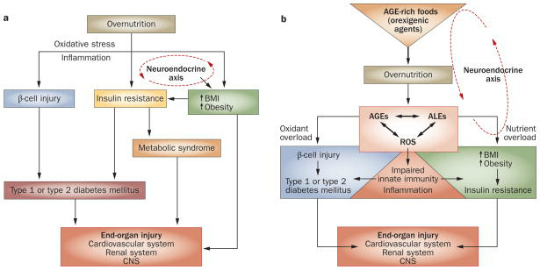New Food Rules
September 24, 2013 Written by JP [Font too small?]Many of us have a basic idea about prudent dietary choices and the health effects they typically produce. For example, if you eat large quantities of low-glycemic fruits and non-starchy vegetables, it’s unlikely that you’ll develop constipation, diabetes and obesity. Conversely, if your diet is loaded with processed foods, your cardiovascular, digestive system and waist line will almost certainly suffer the consequences. But, what you may not know is that there are a few recently discovered, practical ways of applying these old nutritional adages to their greatest advantage.
Some of you may be thinking to yourselves, “I already eat healthy food. What more do I need to do?!”. One answer is: lower the heat. High heat cooking (baking, frying, grilling, etc.) generates substances known as advanced glycation endproducts or AGEs which have been linked to atherosclerosis, diabetes and overweight. The good news is that simply changing the way you cook can reduce exposure to dietary AGEs and subsequently improve insulin sensitivity while lowering excessive inflammation, lipids (cholesterol and triglycerides) and oxidative stress – all of which are considered risk factors for the health conditions previously mentioned. In order to decrease AGEs in home cooked meals, eat more fresh or lightly cooked fruits or vegetables, and utilize specific cooking methods such as slow cookers (Crock-Pot), poaching and steaming. In general, moist cooking and shorter cooking times are best. Adding acidic ingredients, such as lemon juice or vinegar, to marinades has also been shown to inhibit AGEs.
This next tip is for those of you who have a difficult time eating healthfully on a consistent basis. New research presented in the journal Lipids in Health and Disease reports that adding more vegetables to just one meal a day (lunch) supports liver health as indicated by a 20.3% reduction in alanine aminotransferase or ALT, a liver enzyme. Previous studies support the notion that eating plans rich in dietary antioxidants (DASH, Mediterranean and blueberry enriched diets) positively alter liver function and protect this vital organ from damage caused by alcohol, environmental toxins and medications. Two simple ways to implement this information, and the AGEs recommendation above, is to drink berry smoothies or eat creamless vegetables soups and salads as part or all of your mid-day meals. Here are a few examples of recipes that fit the bill: Blueberry-Chocolate Smoothie & “Creamy” Asparagus Soup
Note: Please check out the “Comments & Updates” section of this blog – at the bottom of the page. You can find the latest research about this topic there!
To learn more about the studies referenced in today’s column, please click on the following links:
Study 1 – An Update on Advanced Glycation Endproducts and Atherosclerosis … (link)
Study 2 – Consumption of a Diet Low in Advanced Glycation Endproducts for 4 … (link)
Study 3 – A Diet Based on High-Heat-Treated Foods Promotes Risk Factors for … (link)
Study 4 – Dietary Advanced Glycation Endproducts & Oxidative Stress: In Vivo … (link)
Study 5 – Advanced Glycation End Products in Foods and a Practical Guide to … (link)
Study 6 – Eating a Healthy Lunch Improves Serum Alanine Aminotransferase … (link)
Study 7 – The Dietary Approaches to Stop Hypertension Eating Plan Affects C- … (link)
Study 8 – A Modified Mediterranean Diet is Associated w/ the Greatest Reduction … (link)
Study 9 – Berry Meals and Risk Factors Associated with Metabolic Syndrome … (link)
Study 10 – Food Selection Based on Total Antioxidant Capacity Can Modify … (link)
The Health Effects of AGE-Rich Foods
Source: Nat Rev Endocrinol. 2011 May 24; 7(9): 526–539. (link)
Tags: aging, Cooking, Liver
Posted in Diabetes, Food and Drink, Nutrition



February 7th, 2018 at 3:27 pm
Updated 2/7/18:
https://www.ncbi.nlm.nih.gov/pmc/articles/PMC5788220/
Adv Pharm Bull. 2017 Dec;7(4):645-650.
Effect of Daily Caper Fruit Pickle Consumption on Disease Regression in Patients with Non-Alcoholic Fatty Liver Disease: a Double-Blinded Randomized Clinical Trial.
Purpose: Despite numerous studies on the effects of complementary medicine, to our knowledge, there is no study on the effects of Capparis spinosa on disease regression in non-alcoholic fatty liver disease (NAFLD) patients. We compared the effects of caper fruit pickle consumption, as an Iranian traditional medicine product, on the anthropometric measures and biochemical parameters in different NAFLD patients. Methods: A 12-weeks randomized, controlled, double-blind trial was designed in 44 NAFLD patients randomly categorized for the control (n=22) or caper (n=22). The caper group received 40-50 gr of caper fruit pickles with meals daily. Before and after treatment, we assessed anthropometric measures, grade of fatty liver, serum lipoproteins and liver enzymes. Results: Weight and BMI were significantly decreased in the caper (p<0.001 and p<0.001) and control group (p=0.001 and p=0.001), respectively. Serum TG, TC and LDL.C just were significantly decreased in the control group (p=0.01, p<0.001 and p<0.001, respectively). Adjusted to the baseline measures, serum ALT and AST reduction were significantly higher in the caper than control group from baseline up to the end of the study (p<0.001 and p=0.02, respectively). After weeks 12, disease severity was significantly decreased in the caper group (p <0.001). Conclusion: Our results suggest that daily caper fruit pickle consumption for 12 weeks may be potentially effective on improving the biochemical parameters in NAFLD patients. Further, additional larger controlled trials are needed for the verification of these results.
Be well!
JP